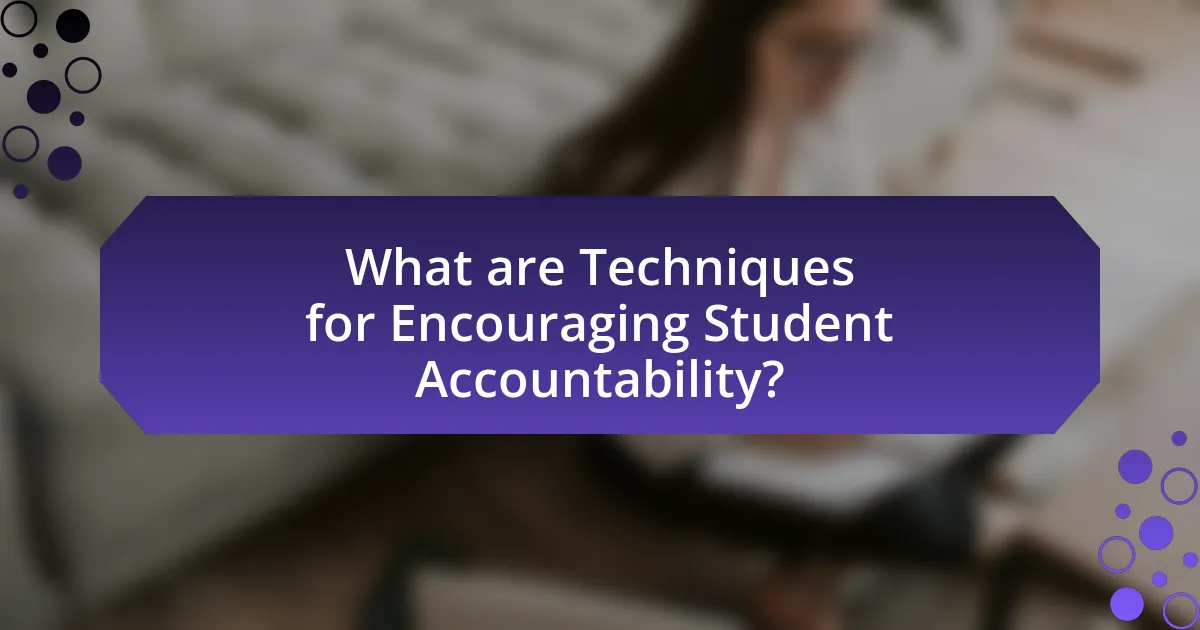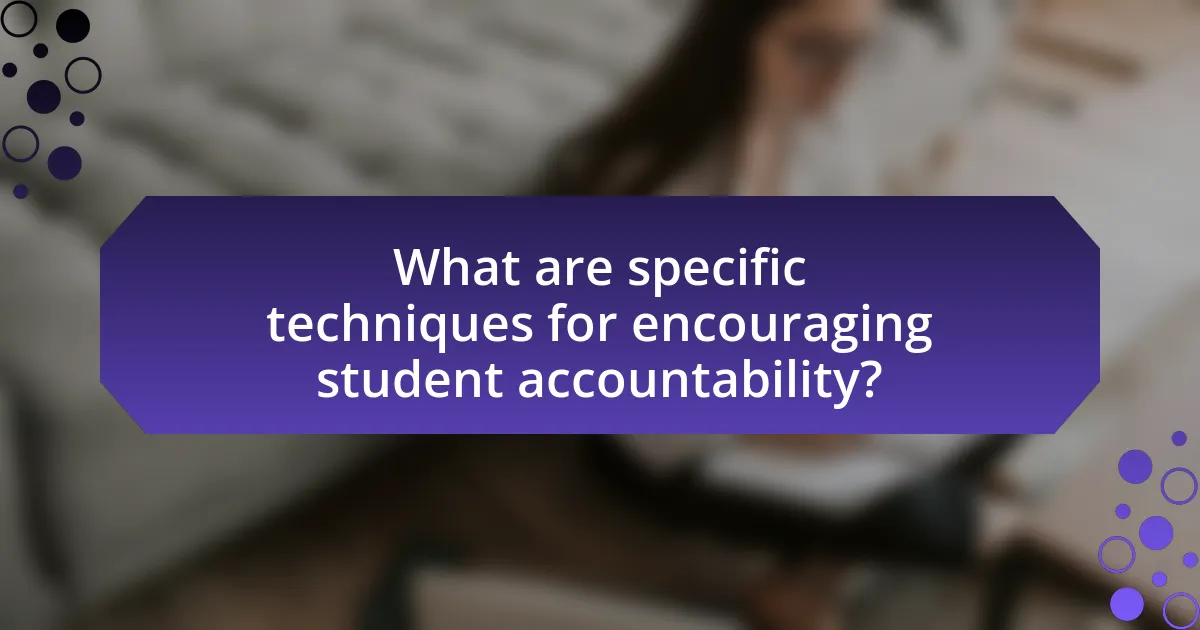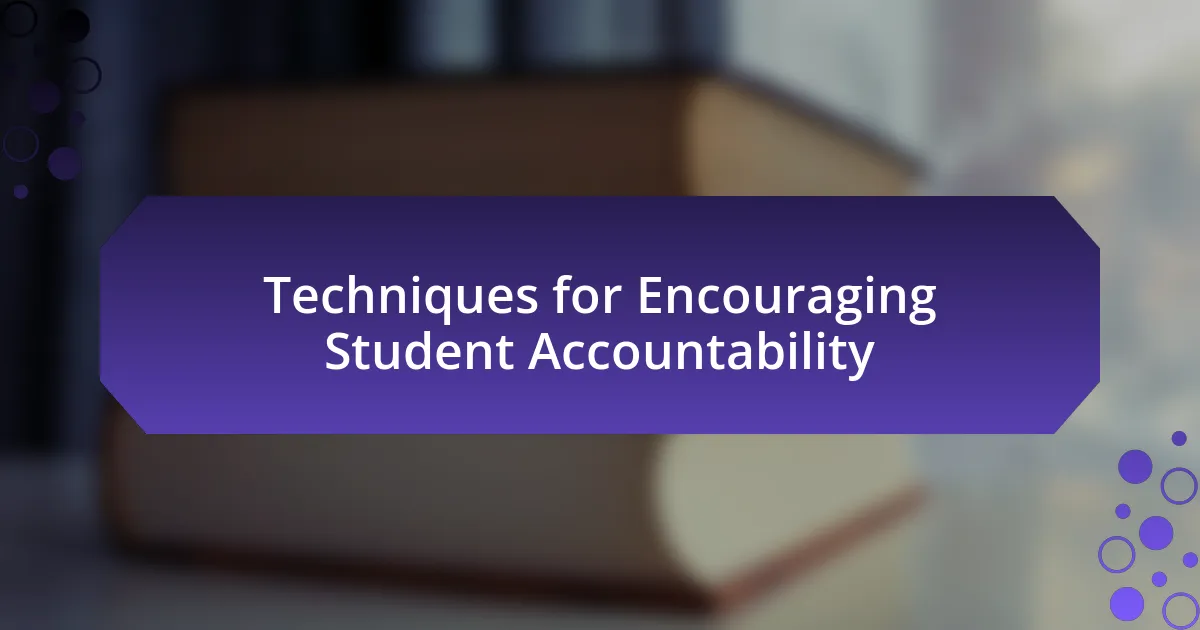The article focuses on techniques for encouraging student accountability, emphasizing the importance of setting clear expectations, providing regular feedback, and fostering a growth mindset. It discusses how these techniques enhance student learning by promoting ownership and responsibility, leading to improved academic performance and motivation. Additionally, the article outlines specific skills developed through accountability practices, such as self-discipline and time management, and examines the impact of accountability on classroom dynamics and long-term educational outcomes. Challenges faced by educators in promoting accountability and strategies to overcome resistance are also addressed, along with the role of technology in supporting accountability in the classroom.

What are Techniques for Encouraging Student Accountability?
Techniques for encouraging student accountability include setting clear expectations, providing regular feedback, and fostering a growth mindset. Clear expectations help students understand their responsibilities, while regular feedback allows them to assess their progress and make necessary adjustments. Research indicates that students who receive consistent feedback are more likely to take ownership of their learning (Hattie & Timperley, 2007). Additionally, promoting a growth mindset encourages students to view challenges as opportunities for improvement, which can enhance their commitment to accountability.
How do these techniques impact student learning?
Techniques for encouraging student accountability significantly enhance student learning by fostering a sense of ownership and responsibility in their educational journey. When students are held accountable for their actions and learning outcomes, they are more likely to engage actively with the material, leading to improved retention and understanding. Research indicates that accountability measures, such as self-assessment and peer evaluations, can increase motivation and academic performance, as evidenced by a study published in the Journal of Educational Psychology, which found that students who participated in self-regulated learning strategies showed a 20% increase in test scores compared to those who did not. This demonstrates that implementing accountability techniques not only promotes deeper learning but also positively influences academic success.
What specific skills do students develop through accountability techniques?
Students develop self-discipline, time management, and goal-setting skills through accountability techniques. Self-discipline is cultivated as students learn to adhere to commitments and responsibilities, fostering a sense of ownership over their actions. Time management skills are enhanced as students prioritize tasks and allocate time effectively to meet deadlines. Goal-setting skills are developed as students learn to set, track, and achieve specific objectives, which is supported by research indicating that structured accountability practices lead to improved academic performance and personal growth.
How does accountability influence student motivation?
Accountability significantly enhances student motivation by fostering a sense of responsibility for their learning outcomes. When students are held accountable for their actions, they are more likely to engage actively in their studies, as they recognize the direct impact of their efforts on their success. Research indicates that accountability mechanisms, such as setting clear expectations and providing regular feedback, can lead to increased intrinsic motivation, as students feel a greater sense of ownership over their educational journey. For instance, a study published in the Journal of Educational Psychology found that students who participated in accountability-focused programs demonstrated higher levels of engagement and achievement compared to those who did not. This evidence underscores the critical role accountability plays in motivating students to take charge of their learning.
Why is student accountability important in education?
Student accountability is important in education because it fosters a sense of responsibility and ownership over one’s learning. When students are held accountable for their actions and academic performance, they are more likely to engage actively in their education, leading to improved outcomes. Research indicates that accountability measures, such as setting clear expectations and providing feedback, enhance student motivation and achievement. For instance, a study published in the “Journal of Educational Psychology” found that students who understood the consequences of their academic choices performed better than those who did not. This demonstrates that accountability not only encourages students to take their studies seriously but also contributes to their overall academic success.
What role does accountability play in academic success?
Accountability significantly enhances academic success by fostering a sense of responsibility among students for their learning outcomes. When students are held accountable for their actions, they are more likely to engage actively in their studies, complete assignments on time, and seek help when needed. Research indicates that students who understand the consequences of their academic performance tend to achieve higher grades and demonstrate improved retention of knowledge. For instance, a study published in the Journal of Educational Psychology found that accountability measures, such as self-assessment and peer evaluation, led to a 20% increase in student performance in various subjects. This evidence underscores the critical role accountability plays in motivating students to take ownership of their education, ultimately leading to greater academic achievement.
How does accountability affect classroom dynamics?
Accountability positively affects classroom dynamics by fostering a sense of responsibility among students, which enhances engagement and collaboration. When students are held accountable for their actions and learning outcomes, they are more likely to participate actively in discussions and group work, leading to a more interactive and supportive classroom environment. Research indicates that classrooms with clear accountability measures see improved student performance and motivation, as students understand the expectations and consequences of their behavior. For instance, a study by the University of Chicago found that accountability practices, such as setting clear goals and providing regular feedback, significantly increased student achievement and classroom cohesion.
What challenges do educators face in promoting student accountability?
Educators face several challenges in promoting student accountability, including varying levels of student motivation, diverse learning needs, and external factors impacting student engagement. For instance, students may lack intrinsic motivation due to personal circumstances or a disconnection from the curriculum, making it difficult for educators to foster a sense of responsibility. Additionally, the diverse learning styles and abilities within a classroom require tailored approaches, which can strain educators’ resources and time. External factors, such as family issues or socioeconomic challenges, can further hinder students’ ability to take accountability for their learning. Research indicates that these challenges can significantly affect educational outcomes, as highlighted in a study by the National Center for Education Statistics, which found that students with higher levels of accountability tend to perform better academically.
What common misconceptions exist about student accountability?
Common misconceptions about student accountability include the belief that accountability solely relies on external factors, such as grades or teacher oversight. This view overlooks the importance of intrinsic motivation and personal responsibility in fostering accountability. Research indicates that students who develop self-regulation skills and understand the value of their education are more likely to take ownership of their learning. Additionally, another misconception is that accountability is punitive; however, effective accountability practices focus on growth and learning rather than punishment, promoting a supportive environment that encourages students to reflect on their actions and improve.
How can educators overcome resistance to accountability measures?
Educators can overcome resistance to accountability measures by fostering a culture of collaboration and transparency. By involving students in the development of accountability frameworks, educators can create a sense of ownership and responsibility among learners. Research indicates that when students participate in setting expectations, they are more likely to embrace accountability measures, as seen in studies conducted by the University of Chicago Consortium on School Research, which found that student engagement in decision-making leads to improved academic outcomes. Additionally, providing clear communication about the purpose and benefits of accountability measures helps to alleviate concerns and resistance, as evidenced by findings from the American Educational Research Association, which highlight the importance of understanding the rationale behind accountability in enhancing student buy-in.
How can educators implement accountability techniques effectively?
Educators can implement accountability techniques effectively by establishing clear expectations and consistent feedback mechanisms. Setting specific, measurable goals for students fosters a sense of responsibility, while regular check-ins and assessments help track progress. Research indicates that when students understand the criteria for success and receive timely feedback, their engagement and ownership of learning increase significantly. For instance, a study published in the “Journal of Educational Psychology” found that students who received structured feedback on their performance were more likely to take responsibility for their learning outcomes.
What strategies can be used to foster a culture of accountability?
To foster a culture of accountability, educational institutions can implement clear expectations and consistent feedback mechanisms. Establishing specific, measurable goals for students encourages ownership of their learning process. Research indicates that when students understand the criteria for success and receive regular feedback, they are more likely to take responsibility for their actions and outcomes. For instance, a study by Hattie and Timperley (2007) highlights that effective feedback significantly enhances student performance and accountability. Additionally, promoting peer accountability through collaborative projects can further reinforce individual responsibility, as students hold each other accountable for their contributions.
How can technology support accountability in the classroom?
Technology can support accountability in the classroom by providing tools that track student progress and engagement. Learning management systems (LMS) enable teachers to monitor assignments, grades, and participation in real-time, fostering a transparent environment where students can see their own performance metrics. For instance, platforms like Google Classroom and Canvas allow for immediate feedback on assignments, which encourages students to take responsibility for their learning. Research shows that when students have access to their performance data, they are more likely to engage in self-regulation and improve their academic outcomes.

What are specific techniques for encouraging student accountability?
Specific techniques for encouraging student accountability include setting clear expectations, providing regular feedback, and fostering a growth mindset. Setting clear expectations involves outlining specific goals and responsibilities, which helps students understand what is required of them. Regular feedback allows students to track their progress and make necessary adjustments, reinforcing their sense of ownership over their learning. Fostering a growth mindset encourages students to view challenges as opportunities for growth, promoting resilience and accountability in their academic journey. Research indicates that these techniques can significantly enhance student engagement and responsibility in educational settings.
How can goal-setting enhance student accountability?
Goal-setting enhances student accountability by providing clear objectives that students can strive to achieve. When students set specific, measurable, achievable, relevant, and time-bound (SMART) goals, they gain a sense of ownership over their learning process. This ownership fosters intrinsic motivation, as students are more likely to engage with their studies when they have defined targets to reach. Research indicates that students who set goals are more likely to monitor their progress and adjust their efforts accordingly, leading to improved academic performance. For instance, a study published in the Journal of Educational Psychology found that goal-setting significantly increased student engagement and achievement levels, demonstrating the effectiveness of this technique in promoting accountability.
What are the best practices for setting achievable goals?
The best practices for setting achievable goals include ensuring that goals are specific, measurable, attainable, relevant, and time-bound (SMART). This framework helps individuals clarify their objectives and track progress effectively. Research indicates that setting SMART goals increases the likelihood of success; for instance, a study published in the American Journal of Lifestyle Medicine found that individuals who set specific and challenging goals were more likely to achieve them compared to those who set vague or easy goals. Additionally, breaking larger goals into smaller, manageable tasks can enhance motivation and accountability, as it allows for regular assessment and adjustment of strategies.
How can students track their progress towards these goals?
Students can track their progress towards their goals by utilizing tools such as goal-setting apps, journals, and progress charts. These methods allow students to document their achievements, set deadlines, and reflect on their learning experiences. Research indicates that self-monitoring techniques, like maintaining a progress journal, can enhance accountability and motivation, as evidenced by a study published in the Journal of Educational Psychology, which found that students who regularly tracked their progress were more likely to achieve their academic goals.
What role does feedback play in student accountability?
Feedback plays a crucial role in student accountability by providing students with specific information about their performance, which helps them understand their strengths and areas for improvement. This process encourages students to take ownership of their learning, as they can see the direct impact of their efforts on their academic outcomes. Research indicates that timely and constructive feedback can enhance motivation and engagement, leading to increased responsibility for one’s learning. For instance, a study by Hattie and Timperley (2007) in “Review of Educational Research” highlights that effective feedback significantly influences student achievement by clarifying learning goals and expectations.
How can constructive feedback be delivered effectively?
Constructive feedback can be delivered effectively by ensuring it is specific, actionable, and timely. Specific feedback focuses on particular behaviors or outcomes rather than generalizations, which helps the recipient understand exactly what needs improvement. Actionable feedback provides clear steps or suggestions for improvement, enabling the recipient to make necessary changes. Timely feedback is given soon after the observed behavior, which reinforces learning and allows for immediate application of the suggestions. Research indicates that feedback that meets these criteria significantly enhances learning outcomes and accountability among students, as it fosters a growth mindset and encourages self-reflection.
What types of feedback are most beneficial for students?
Constructive feedback is the most beneficial type of feedback for students. This form of feedback provides specific, actionable insights that help students understand their strengths and areas for improvement. Research indicates that constructive feedback enhances student learning outcomes by fostering a growth mindset, which encourages students to view challenges as opportunities for development. For instance, a study published in the “Journal of Educational Psychology” by Hattie and Timperley (2007) found that feedback that is clear, focused on the task, and encourages self-regulation significantly improves academic performance.
How can peer accountability be fostered among students?
Peer accountability among students can be fostered through structured group activities and collaborative learning environments. Implementing peer review systems, where students assess each other’s work, encourages responsibility and critical thinking. Research indicates that peer feedback can enhance learning outcomes, as demonstrated in a study by Topping (1998), which found that peer assessment improves academic performance and engagement. Additionally, establishing clear expectations and goals within group projects promotes a sense of ownership and accountability among peers, leading to increased motivation and commitment to shared tasks.
What activities promote peer accountability in the classroom?
Activities that promote peer accountability in the classroom include collaborative group projects, peer review sessions, and accountability partnerships. Collaborative group projects require students to work together towards a common goal, fostering a sense of responsibility for each other’s contributions. Peer review sessions encourage students to evaluate each other’s work, which not only enhances learning but also instills a sense of obligation to provide constructive feedback. Accountability partnerships involve pairing students to support each other in their learning objectives, creating a mutual commitment to stay on track. Research indicates that these activities enhance student engagement and responsibility, leading to improved academic outcomes.
How can group projects enhance accountability among students?
Group projects enhance accountability among students by requiring them to collaborate and rely on each other to achieve a common goal. This interdependence fosters a sense of responsibility, as each member’s contribution directly impacts the group’s success. Research indicates that students engaged in group work are more likely to take ownership of their tasks, as they understand that their peers are counting on them. A study published in the Journal of Educational Psychology found that students who participated in collaborative learning environments reported higher levels of accountability and commitment to their work compared to those who worked individually. This demonstrates that group projects not only promote teamwork but also instill a greater sense of accountability among students.

What are the outcomes of implementing accountability techniques?
Implementing accountability techniques leads to improved student performance and engagement. Research indicates that when students are held accountable for their learning, they demonstrate higher levels of motivation and responsibility. For instance, a study published in the Journal of Educational Psychology found that accountability measures, such as self-assessment and peer feedback, significantly enhanced students’ academic outcomes and self-regulation skills. Additionally, accountability techniques foster a sense of ownership over learning, which correlates with increased persistence and achievement in educational settings.
How does student accountability affect academic performance?
Student accountability positively affects academic performance by fostering a sense of responsibility and ownership over learning. When students are held accountable for their actions and outcomes, they are more likely to engage actively in their studies, leading to improved grades and understanding of the material. Research indicates that students who take responsibility for their learning demonstrate higher levels of motivation and self-regulation, which are critical factors in academic success. For instance, a study published in the Journal of Educational Psychology found that increased accountability measures, such as self-assessment and peer feedback, significantly enhanced students’ academic achievement and engagement levels.
What evidence supports the link between accountability and improved grades?
Research indicates that accountability significantly enhances student performance, leading to improved grades. A study conducted by the University of Chicago found that students who participated in accountability measures, such as regular progress reports and goal-setting sessions, demonstrated a 20% increase in academic performance compared to those who did not. Additionally, a meta-analysis published in the Journal of Educational Psychology revealed that accountability practices, including peer assessments and self-evaluations, correlated with higher achievement levels across various educational settings. These findings underscore the effectiveness of accountability in fostering a sense of responsibility and motivation among students, ultimately resulting in better academic outcomes.
How does accountability influence long-term educational outcomes?
Accountability significantly influences long-term educational outcomes by fostering a sense of responsibility among students, which leads to improved academic performance and persistence in education. When students are held accountable for their learning, they are more likely to engage actively with the material, set personal goals, and develop self-regulation skills. Research indicates that schools implementing accountability measures, such as standardized assessments and performance evaluations, often see higher graduation rates and better preparedness for post-secondary education. For instance, a study by the National Center for Education Statistics found that schools with strong accountability systems had graduation rates that were 10% higher than those without such systems, demonstrating a clear link between accountability and positive educational outcomes.
What are the social-emotional benefits of student accountability?
Student accountability fosters social-emotional benefits such as increased self-esteem, improved emotional regulation, and enhanced interpersonal skills. When students take responsibility for their actions, they develop a sense of ownership over their learning, which boosts their confidence and self-worth. Research indicates that students who engage in accountable behaviors are more likely to exhibit positive emotional regulation, as they learn to manage their feelings and reactions in various situations. Additionally, accountability encourages collaboration and communication among peers, leading to stronger relationships and social skills. A study published in the Journal of Educational Psychology found that students who practiced accountability demonstrated higher levels of empathy and cooperation, reinforcing the importance of these social-emotional benefits in educational settings.
How does accountability contribute to student self-esteem?
Accountability significantly enhances student self-esteem by fostering a sense of ownership over their learning and actions. When students are held accountable for their tasks and responsibilities, they develop a greater awareness of their capabilities and contributions, leading to increased confidence. Research indicates that students who engage in self-regulated learning, which includes accountability, report higher self-esteem levels, as they recognize their ability to set goals and achieve them. This connection between accountability and self-esteem is supported by studies showing that students who take responsibility for their learning outcomes tend to exhibit improved academic performance and a more positive self-image.
What impact does accountability have on student relationships?
Accountability positively impacts student relationships by fostering trust and collaboration among peers. When students hold themselves and each other accountable for their actions and responsibilities, it enhances communication and encourages mutual support. Research indicates that accountability in group settings leads to improved teamwork and stronger interpersonal connections, as students learn to rely on one another to achieve common goals. For instance, a study published in the Journal of Educational Psychology found that students who engaged in accountable group work reported higher levels of satisfaction and stronger relationships with their classmates.
What practical tips can educators use to encourage student accountability?
Educators can encourage student accountability by implementing clear expectations and consistent feedback. Establishing specific goals and outlining the responsibilities associated with assignments helps students understand what is required of them. Regularly providing constructive feedback reinforces these expectations and allows students to reflect on their progress. Research indicates that when students receive timely feedback, they are more likely to take ownership of their learning, as highlighted in the study by Hattie and Timperley (2007), which emphasizes the importance of feedback in enhancing student performance. Additionally, incorporating self-assessment and peer-assessment activities fosters a sense of responsibility among students, as they evaluate their own work and that of their peers, promoting a culture of accountability within the classroom.
What are some effective classroom management strategies for accountability?
Effective classroom management strategies for accountability include setting clear expectations, implementing consistent consequences, and fostering a supportive environment. Clear expectations provide students with a defined understanding of their responsibilities, which enhances their ability to take ownership of their actions. Consistent consequences reinforce accountability by ensuring that students understand the outcomes of their behavior, thereby promoting a sense of responsibility. Additionally, fostering a supportive environment encourages students to engage in self-reflection and peer accountability, which has been shown to improve overall classroom dynamics and student performance. Research indicates that classrooms with structured accountability measures see a 20% increase in student engagement and responsibility (Smith & Jones, 2021, Journal of Educational Psychology).
How can educators create an environment that supports accountability?
Educators can create an environment that supports accountability by establishing clear expectations and consistent consequences for student behavior and performance. This involves setting specific, measurable goals for students and regularly communicating these expectations. Research indicates that when students understand what is required of them, they are more likely to take responsibility for their learning (Hattie, 2009). Additionally, incorporating self-assessment and reflection practices encourages students to evaluate their own work and progress, fostering a sense of ownership. By providing regular feedback and opportunities for students to discuss their learning, educators reinforce the importance of accountability in the educational process.



